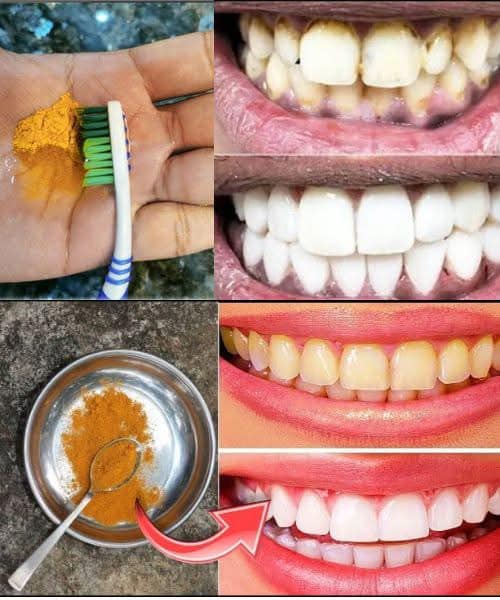When it comes to maintaining a bright, healthy smile, most people assume they need expensive dental treatments, whitening strips, or chemical-laden toothpaste. But what if there was a natural, affordable solution hiding right in your kitchen pantry? Turmeric, a vibrant golden spice often used in cooking, has gained recognition for its impressive health benefits, including its ability to improve oral hygiene. Known for its anti-inflammatory, antibacterial, and mild abrasive properties, turmeric offers an effective and safe alternative for whitening teeth and removing tartar without the hefty price tag or exposure to harsh chemicals.

In this article, we’ll break down how turmeric works to improve dental health, how you can use it effectively, and the precautions you should consider before incorporating it into your oral care routine.
Why Turmeric is Effective for Oral Health
Turmeric isn’t just a spice for curries—it’s a powerful natural remedy that has been used in traditional medicine for centuries. When it comes to dental care, turmeric offers several impressive benefits:
- Antibacterial Properties: Harmful bacteria in your mouth can lead to plaque buildup, tartar, and gum disease. Turmeric’s natural antibacterial properties help eliminate these bacteria, reducing plaque formation and protecting your gums.
- Anti-Inflammatory Effects: If you suffer from swollen or inflamed gums due to tartar buildup or poor oral hygiene, turmeric can soothe the irritation and reduce swelling.
- Natural Whitening Agent: The mild abrasive texture of turmeric gently scrubs away surface stains on your teeth, revealing a brighter smile without damaging the enamel.
- Safe and Chemical-Free: Many commercial dental products contain harsh chemicals that can erode enamel over time. Turmeric, on the other hand, is 100% natural and gentle on your teeth and gums.
These combined benefits make turmeric a powerful, natural solution for maintaining healthy teeth and gums without relying on expensive dental treatments.
How to Use Turmeric for Teeth Whitening and Tartar Removal
One of the biggest advantages of using turmeric for oral care is how simple and accessible it is. You don’t need fancy tools or hard-to-find ingredients—just a few pantry staples.
Ingredients:
- 1 teaspoon of turmeric powder
- A pinch of baking soda (optional, for enhanced whitening power)
- A few drops of coconut oil
Instructions:
- Combine the turmeric powder, baking soda, and coconut oil in a small bowl until you form a smooth paste.
- Dip your toothbrush into the mixture.
- Brush your teeth gently for about 2 minutes, focusing on stained or tartar-prone areas.
- Rinse your mouth thoroughly with water.
- Follow up by brushing your teeth with regular toothpaste to remove any lingering turmeric residue.
For best results, repeat this process 2–3 times a week. Over time, you’ll notice cleaner, whiter teeth and healthier gums.
Benefits of Using Turmeric for Dental Health
When used regularly, turmeric can significantly improve your oral hygiene. Here’s how:
- Removes Tartar: Turmeric works to break down tartar and prevent future buildup, keeping your teeth smooth and clean.
- Brightens Teeth: Its natural abrasive qualities gently remove surface stains, restoring your teeth’s natural whiteness.
- Strengthens Gum Health: The anti-inflammatory properties reduce swelling, bleeding, and gum tenderness.
- Fights Bad Breath: By eliminating odor-causing bacteria, turmeric helps keep your breath fresh and clean.
- Affordable and Accessible: Compared to commercial teeth-whitening products or dental treatments, turmeric is an inexpensive solution available in almost every grocery store.
Incorporating turmeric into your dental routine not only improves oral health but also saves you money and reduces exposure to unnecessary chemicals.
Precautions When Using Turmeric for Oral Care
While turmeric is generally safe and highly effective, there are a few precautions you should keep in mind:
- Temporary Staining: Turmeric has a natural yellow pigment that can temporarily stain your toothbrush, gums, or lips. However, these stains are harmless and typically fade after rinsing and brushing with regular toothpaste.
- Allergic Reactions: Though rare, some individuals may have a sensitivity or allergy to turmeric. Before using it extensively, test a small amount to ensure no irritation occurs.
- Not a Substitute for Professional Dental Care: While turmeric can complement your dental care routine, it’s not a replacement for regular dental cleanings or professional check-ups.
Being mindful of these precautions will help you maximize the benefits of turmeric without any unwanted side effects.
Why Natural Remedies Like Turmeric Are Worth Considering
Commercial teeth-whitening products often come with side effects, including enamel erosion and tooth sensitivity caused by harsh chemicals like hydrogen peroxide. In contrast, turmeric offers a gentler, safer approach:
- Chemical-Free: No harsh additives, preservatives, or artificial ingredients.
- Cost-Effective: A single jar of turmeric costs far less than repeated professional whitening treatments.
- Multi-Purpose Benefits: Beyond oral care, turmeric supports overall health with its anti-inflammatory and immune-boosting properties.
By choosing natural remedies like turmeric, you’re not only prioritizing your dental health but also reducing your reliance on chemical-laden products.
Final Thoughts
Turmeric is far more than just a spice—it’s a versatile and effective natural remedy for dental health. With its antibacterial, anti-inflammatory, and mild abrasive properties, turmeric offers a safe, affordable, and chemical-free way to whiten your teeth, remove tartar, and improve gum health.
However, it’s important to remember that turmeric isn’t a magical cure-all. It works best when paired with regular brushing, flossing, and professional dental care.
So, why not give it a try? With just a teaspoon of turmeric, a pinch of baking soda, and a few drops of coconut oil, you can take a step toward a brighter smile and healthier gums—all from the comfort of your home.
If you found these tips helpful, share them with friends and family. Sometimes, the best solutions aren’t found in expensive dental clinics—they’re already sitting in your kitchen cabinet.